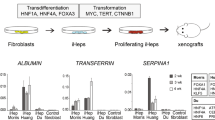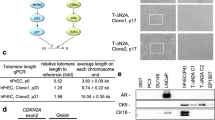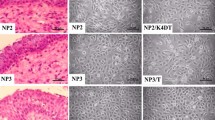Abstract
MALIGNANT transformation of cells in culture can serve as a means for studying cellular and molecular mechanisms of chemical carcinogenesis and as a method for screening for environmental carcinogens (see refs 1, 2 for reviews). Although most of these systems involve fibroblast cultures from mouse, rat and hamster embryos3–5, there are few reports of the malignant transformation of epithelial cell cultures except with liver cells6,7. However, there are some inherent difficulties in working with epithelial cells derived from liver, a highly specialised organ with a multitude of enzyme activities. Many of these enzymes tend to decrease in activity in long-term culture, and may not be equivalent biochemically to their state in vivo. Thus, biochemical studies of carcinogenesis are difficult with such cells, and there are no reports of a normal hepatocyte line that can be transformed in culture and produce a hepatoma on inoculation into the syngeneic host. There are some reports of malignant epithelial cell lines that originated from treating primary cultures obtained from urinary bladder, trachea, kidney, prostate and submandibular gland with different chemical carcinogens8–13. In such cases, however, there are no normal counterparts available for comparison of biological properties. So far as we know, no line of epithelial cells apart from liver cells has transformed with chemical carcinogen and given rise to carcinomas when inoculated in the appropriate host. We now describe an epithelial cell line from wild mouse embryo, which can be transformed with polycyclic aromatic hydrocarbons. These transformed cells produce poorly differentiated carcinomas when inoculated into nude mice.
This is a preview of subscription content, access via your institution
Access options
Subscribe to this journal
Receive 51 print issues and online access
$199.00 per year
only $3.90 per issue
Buy this article
- Purchase on Springer Link
- Instant access to full article PDF
Prices may be subject to local taxes which are calculated during checkout
Similar content being viewed by others
References
Casto, B. C. & DiPaolo, J. A. Prog. med. Virol. 16, 1–47 (1973).
Heidelberger, C. A. Rev. Biochem. 44, 79–121 (1975).
Reznikoff, C. A., Bertram, J. S., Brankow, D. W. & Heidelberger, C. Cancer Res. 33, 3239–3249 (1973).
Freeman, A. E. et al. J. natn. Cancer Inst. 51, 799–808 (1973).
Pienta, R. J., Poiley, J. A. & Lebherz, W. B., III Int. J. Cancer 19, 642–655 (1977).
Borek, C. Proc. natn. Acad. Sci. U.S.A. 69, 956–959 (1972).
Weinstein, I. B., Yamaguchi, N., Gebert, R. & Kaigh, M. E. In Vitro 11, 130–141 (1975).
Idoine, J. B., Elliot, J. M., Wilson, J. M. & Weisburger, E. K. In Vitro 12, 541–553 (1976).
Hashimoto, Y. & Kitigawa, H. S. Nature 252, 497–499 (1974).
Marchok, A. C., Rhoton, J. C., Griesemer, R. A. & Nettesheim, P. Cancer Res. 37, 1811–1821 (1977).
Hard, G. D., King, H., Borland, R., Stewart, B. W. & Dobrostanki, B. Oncology 34, 16–19 (1977).
Norris, J. S., Bowden, C. & Kohler, P. O. In Vitro 13, 108–114 (1977).
Knowles, M. S. & Franks, L. M. Cancer Res. 37, 3917–3924 (1977).
Aaronson, A. S. & Todaro, G. J. J. cell. Physiol. 72, 141–148 (1968).
Author information
Authors and Affiliations
Rights and permissions
About this article
Cite this article
MONDAL, S., SALA, M. Malignant transformation of a mouse epithelial cell line with poly cyclic aromatic hydrocarbons. Nature 274, 370–372 (1978). https://doi.org/10.1038/274370a0
Received:
Accepted:
Issue Date:
DOI: https://doi.org/10.1038/274370a0
This article is cited by
-
A fetal respiratory epithelial cell line for studying some problems of transplacental carcinogenesis in Syrian golden hamsters
Journal of Cancer Research and Clinical Oncology (1982)
Comments
By submitting a comment you agree to abide by our Terms and Community Guidelines. If you find something abusive or that does not comply with our terms or guidelines please flag it as inappropriate.



